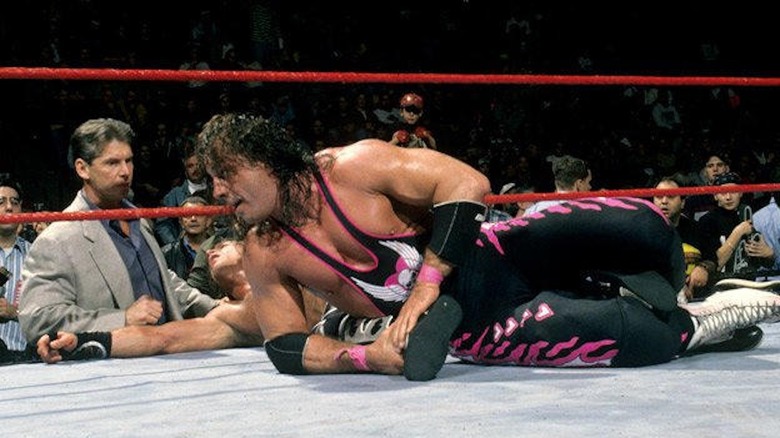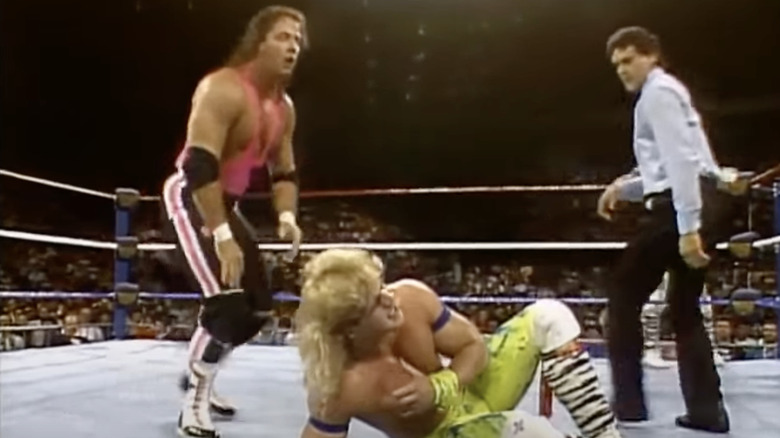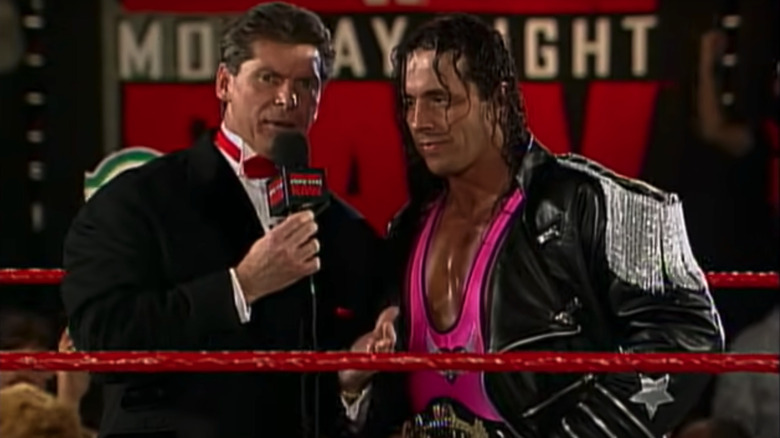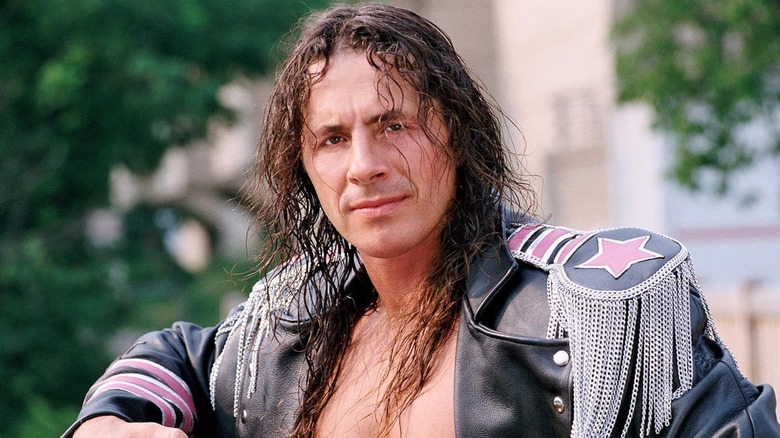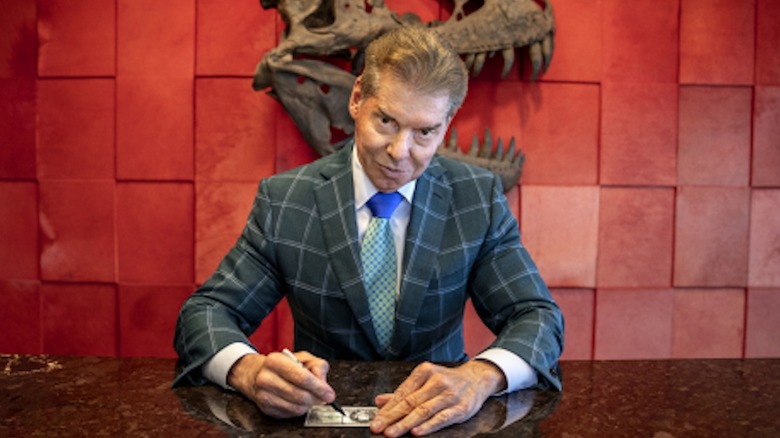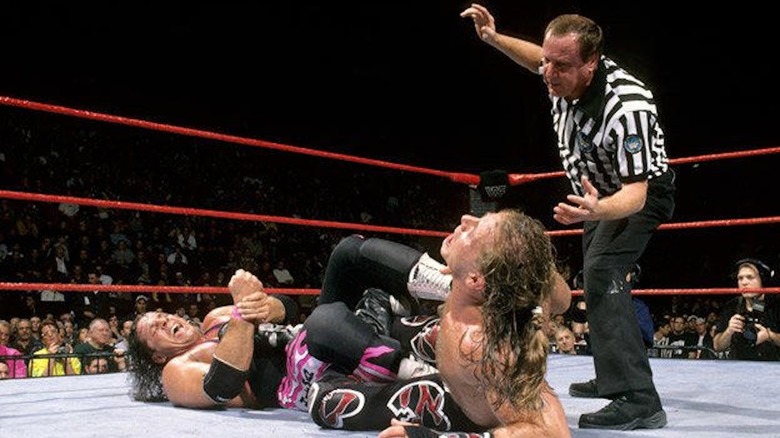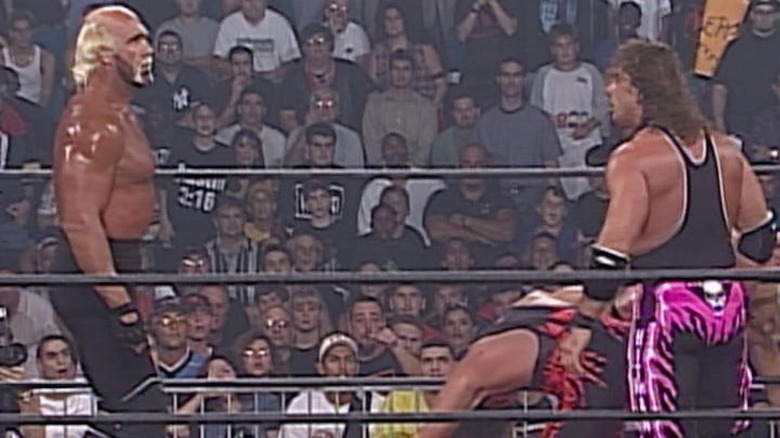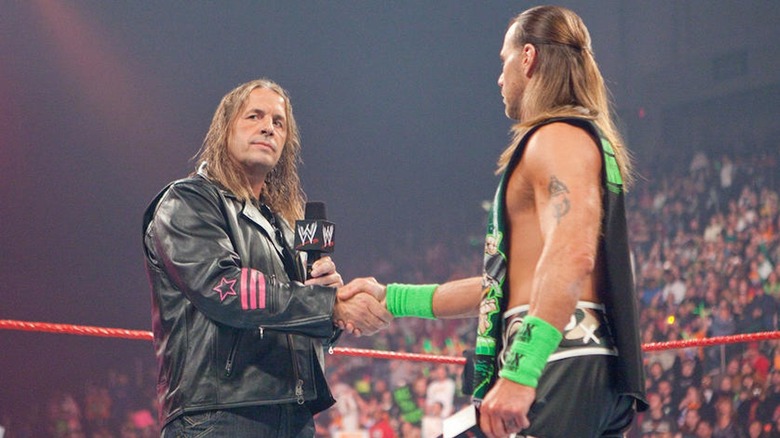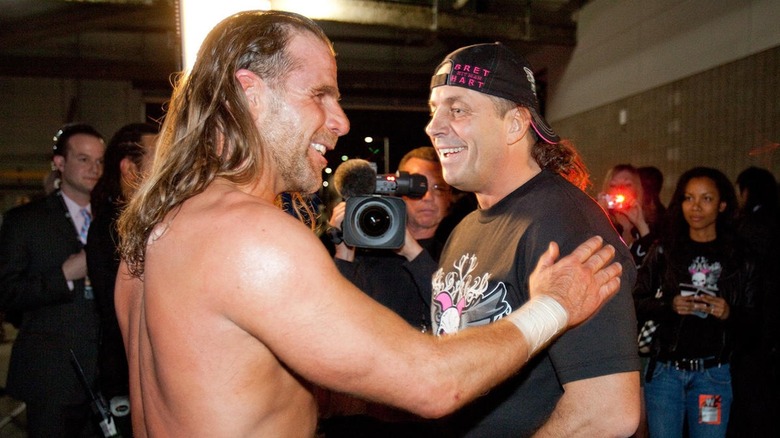The Infamous Montreal Screwjob Explained
Only a handful of iconic moments in the history of professional wrestling are still talked about as frequently as what became known as "The Montreal Screwjob." Bret Hart's final match in WWE before leaving for WCW was forever marked in infamy when Vince McMahon orchestrated a plan to ensure that "The Hitman" couldn't possibly leave the company with the WWE Championship in tow. Despite his many years of loyal service to McMahon, the chairman determined that Hart simply couldn't be trusted with the belt — certainly not after former Women's Champion Alundra Blayze, now Madusa, had taken her title and thrown it in the trash live on WCW television.
More than 26 years later, McMahon's careful ploy to have referee Earl Hebner prematurely ring the bell while Shawn Michaels had Hart in his own Sharpshooter submission hold stands firm as a cornerstone memory in the minds of wrestling fans, and a pivotal moment in the history of the business. What might have been different if Hart had remained under what was effectively a lifelong contract he had previously inked with McMahon, or even if his exit had gone otherwise, is a conversation that seemingly has no end.
But the fun part about an otherwise unfortunate situation remains recapping what happened, how it happened, what it all meant, and where it leaves all involved parties today. This is The Montreal Screwjob, explained.
HBK/Bret history pre-rivalry
Long before the incident in question laid the groundwork for what became The Attitude Era, Bret Hart and Shawn Michaels were the biggest stars in its predecessor, "The New Generation." The early-to-mid 1990s saw WWE pivot hard away from aged superstars who had left the company for the perceived greener pastures of WCW, replacing the Hulk Hogans and Randy Savages of the world with new top talents, and Hart and Michaels led the way.
Though they were never best friends, Hart and Michaels got along for quite some time in the locker room, including as reigning WWE and Intercontinental Champions, which was a big plus as your two biggest draws rowing in the same direction is a good thing for any boat. Hart, elder to Michaels by a shade over eight years, likely saw similarities in their career paths, with both men part of successful tag teams until outshining their partners and forging forward as singles stars.
Their relationship was just fine leading to a championship match at Survivor Series 1992, in which Hart successfully defended his WWE Title, while Michaels' Intercontinental Title was not on the line. In 1993, things would start to change, as would Michaels, according to most accounts (including his own), upon the arrival of Scott Hall and Kevin Nash, the formation of "The Kliq," and "The Heartbreak Kid" becoming a bit too big for his britches, rubbing vets like Hart the wrong way. And in 1996, following Michaels' capturing the WWE Championship in an Iron Man Match, animosity was cemented when a victorious Michaels told referee Earl Hebner to get Hart's "a** out of the ring," leaving Hart none too pleased.
Bret and Vince relationship
The relationship between Bret Hart and Vince McMahon began in 1984 when, amid his efforts to take over the North American wrestling landscape, McMahon purchased Stu Hart's Stampede Wrestling for a reported $750,000, and with the sale came the contracts of Bret Hart, Dynamite Kid, and Davey Boy Smith. Hart would later state on his "Confessions of The Hitman" podcast that McMahon never actually paid the agreed-upon purchase price, and The Hart Family never brought it up out of fear that it might negatively affect Bret's burgeoning career.
Over the years, as Hart's star continued to shine brighter and the company experienced more and more success, the relationship between he and McMahon grew strong. Many times over the years, Hart would describe it as "fatherly," and even during times of uncertainty, such as when Bret's contract was nearing its end, things remained cordial. Onscreen, of course, Hart's exit from WWE became the catalyst for the Mr. McMahon character that launched The Attitude Era, and things quite understandably soured for some time following his departure.
These days, people might think it odd that Hart has only good things to say about what McMahon meant to the wrestling business, especially considering that their reconciliation came after all of the tumult of The Montreal Incident, Owen Hart's tragic death, lawsuits, and lots of other strife. But, as with Shawn Michaels, Hart has likened grudges with McMahon to carrying a big bag of rocks over his shoulder for far too long. Letting that down, on both ends, brings inimitable relief.
Re-signing in 1996
As the Monday Night War escalated, having already lost Scott Hall, Kevin Nash, and many others to its fiercest rival in WCW, WWE was in no position to let Bret Hart also leave the company. That said, Eric Bischoff and WCW had the deepest of pockets, and approached Hart with what was reportedly a 3-year, $9 million contract. Unable to match the per-year dollar amount but very much inclined to keep Hart in the fold, Vince McMahon thought outside the box and presented Hart with what was effectively a lifetime deal (technically spanning 20 years).
Torn over the decision, as documented in "Wrestling With Shadows," Hart decided to re-sign with WWE, and his rivalries with Shawn Michaels and "Stone Cold" Steve Austin were the driving forces behind the companies programming for much of the following year. An injured Michaels would relinquish the WWE Championship, which Hart would regain, albeit briefly, thanks to Austin, as their feud grew hotter.
Hart, now a heel in the United States built around his excessive pro-Canadian virtues, would recapture the WWE Championship once more, defeating The Undertaker after Michaels, as guest referee, inadvertently hit the champion with a chair and begrudgingly had to count the pinfall for his arch-nemesis. And now, trudging toward 1997 with Hart once again as champion, things began to change for McMahon and WWE and in turn, Hart himself.
Vince flips the script (breaking contract)
As Vince McMahon, the announcer, was emerging more and more onscreen as the real-life owner of WWE, he and Bret Hart were beginning to feud on WWE programming as well. Behind the scenes, changes were also afoot. Facing financial peril amid dwindling ratings and a product that just wasn't as hot as its closest competition, McMahon told Hart that WWE simply couldn't afford to honor the 20-year contract he'd only recently signed, encouraged him to re-open talks with WCW, and even went so far as to offer to help negotiate his deal with Eric Bischoff. The latter never happened and Hart re-emphasized that despite his differences with the edgier direction in which the company was headed, he did not want to leave. Feeling he had no real choice though, Hart, with a simple press of a button on his fax machine, secured a contract with WCW and would be leaving WWE in short order.
What was left to resolve at this point was only a matter of creative direction and most importantly, what to do with Bret as WWE champion. After all, about the worst thing that can happen to a wrestling promotion, especially in the midst of a losing battle with a rival, is to have its championship belt appear on opposition programming. This had already happened with the Women's Championship, when the former Alundra Blayze appeared on "WCW Nitro," throwing the belt in the trash on live TV.
Hart, being a wrestling lifer, said he was willing to drop the title to whomever other than Shawn Michaels, since the latter had apparently told him he wouldn't do the same for him. Unable to come up with a clear cut transition to satisfy both parties, McMahon and company would once again have to do outside-the-box thinking, with the best interest of WWE at the forefront of everyone's mind.
Survivor Series in Montreal
After much deliberation, it was agreed upon that the WWE Championship match between Bret Hart and Shawn Michaels at Survivor Series 1997 in Montreal would result in a double disqualification, or no contest finish after a brawl involving other wrestlers on both sides halted the in-ring action. At least that was Hart's understanding of things. Unbeknownst to the champion, McMahon had other ideas, wanting to protect his company (and its top title) at all costs. He'd need allies to pull this off, namely Michaels, who initially said that he wanted nothing to do with it, but ultimately agreed to "do whatever was needed of him." Also in on the "screwjob" finish was referee Earl Hebner, allegedly informed of what was to go down just before the match began, longtime McMahon associate Gerald Brisco, and Triple H, some added muscle just in case things got extra nasty.
Hart and Michaels battled ferociously outside the ring and into the crowd in the beginning stages of the contest, only to make their way back inside for a previously-discussed spot involving Hart's trademark Sharpshooter submission hold. Michaels was actually to put the move on Hart, with the latter reversing the maneuver and the match would continue. Instead, just seconds into Michaels applying the hold, Hebner began flailing his arms frantically, purportedly "asking" Hart if he wanted to give up, and then hastily called for the bell before a swift exit from the ring.
A flabbergasted Hart, as the move broke down when the bell rang, reached for Michaels' leg but pulled back, realizing what had happened. Once that set in, an enraged Hart leaned on the ropes, staring at McMahon, now at ringside, before spitting right into the owner's face. Hart would then trash the announce table and take out his frustrations otherwise around the ring, before re-entering and pantomiming the letters "W" "C" "W" directly into the hard camera. McMahon had done what he felt he needed to do. But there would be a price to pay soon after.
Immediate Aftermath
As if wiping another man's spit out of one's eye wasn't enough, Vince McMahon would head backstage knowing that he had no choice but to face Bret Hart and admit to his part as the mastermind behind the "Montreal Screwjob." At first, McMahon retreated to his office and locked the door, while Hart questioned Michaels about his involvement in what went down. Michaels denied being aware of what was to take place, telling Hart, "My hands are clean of this one, I swear to God."
The Undertaker, who had watched the match from McMahon's office, went and told Hart that he couldn't believe what he had just seen, before returning to demand that McMahon go and apologize to Hart and address the situation directly. McMahon addressed Hart, explaining why he thought he needed to do what he did, to which Hart scoffed and warned McMahon to leave now or else he was going to knock him out. McMahon didn't leave and Hart made good on his promise, leveling the WWE owner with an uppercut and effectively ending the drama for the evening.
Outside of Hart and McMahon, many others were affected by the events in Montreal. Several wrestlers were incensed, threatening to boycott "Raw" the next night or leave the company entirely, but all were encouraged to fulfill their contractual obligations, lest they ruin their own careers over the incident. Mick Foley skipped the ensuing episode of "Raw," but ultimately returned at the encouragement of Jim Cornette. Hart allies Jim Neidhart, Davey Boy Smith, and Rick Rude would all eventually leave for WCW in the next few months.
Vince's Side of Things (Bret Screwed Bret)
On the night after Survivor Series in Montreal, Vince McMahon appeared in a one-on-one interview segment on "Raw," hosted by Jim Ross. Explaining much of what happened in a kayfabe-breaking manner that had not been seen much previously, McMahon cited the time-honored tradition of going out on one's back and transitioning a title before leaving the company.
He denied accusations of "screwing Bret Hart," but rather asserted that "Bret screwed Bret" on account of his unwillingness to drop the title to Shawn Michaels. The conversation transitioned to the financial reasons behind McMahon rescinding the previously agreed-upon 20-year contract, and McMahon stating that the least he could do for Bret was to let him go, make the money he would make from WCW and refocus on what was best for WWE.
McMahon explained disappointment in Hart hitting him, said he received a concussion because of it, and that he allowed Bret to strike him, rather than this being the result of a one-on-one confrontation. He also noted, at the time, that he'd considered legal action stemming from the punch, but that he wasn't currently pursuing it, and it would "depend on Bret" as to whether or not McMahon might reconsider to that end.
WCW and Bret
Attempting to put the events of his WWE exit behind him, Bret Hart would debut on "WCW Nitro" on December 15, 1997, setting up a scenario where he would serve as guest referee in a match between Eric Bischoff and Larry Zbyszko at Starrcade. Later in the event, Hart appeared during the WCW World Championship match, filling in for a downed referee to declare Sting the new champion via submission. With his non-compete clause from WWE now expired, in January of 1998, Hart was cleared to wrestle and began a feud with Ric Flair that culminated in a win at Souled Out in his first ever match for WCW.
From there, things fizzled for Hart in WCW, as he aligned himself with Hogan and the nWo, then about-faced, meandering through various midcard feuds. This made longtime wrestling fans wonder just how in the world WCW couldn't have captured the momentum of a talent the level of Bret Hart joining the company, especially after such controversy as that which his WWE exit drummed up.
Hart would win the WCW World Championship in 1999, and defended it against Goldberg at Starrcade later that year. During the match, however, a head kick from Goldberg gave Hart a major concussion, and the ensuing post-concussion syndrome would ultimately force his retirement from professional wrestling in October 2000.
Bret and Shawn Make Up
While Bret Hart and Vince McMahon put the events of The Montreal Screwjob behind them enough to begin a working relationship again in 2005, collaborating on a DVD set, and facilitating Hart's 2006 WWE Hall of Fame induction, Hart and Shawn Michaels had not spoken since the event and plenty of hard feelings were continuously expressed from both sides.
Michaels would eventually admit that he was in on the events at Survivor Series from the beginning, and while Hart had previously said he had no interest in meeting or speaking with Michaels, through conversations with Tyson Kidd, offered up his phone number and encouraged Michaels to reach out. Ahead of an episode of "Raw" in January 2010, Michaels approached Hart backstage, shook his hand, and asked if they could go talk, to which Hart said, in effect, "Let's do it in the ring."
Later that night, live on TV, Hart addressed the WWE Universe and invited Michaels down to the ring to bury the hatchet once and for all. Michaels offered his apologies, and the two shook hands. As he prepared to exit the ring, Michaels turned around aggressively, slightly teasing an attack, before hugging Hart at length, seemingly putting an end to the mutual animosity that had long existed.
Legacy
So much came out of The Montreal Screwjob, which may well be the most talked about moment in wrestling history. It added major steam behind the Mr. McMahon character, whose feud with "Stone Cold" Steve Austin would kickstart The Attitude Era and a return to prominence for WWE over WCW. McMahon would later purchase WCW, putting an end to that "war" and shifting the industry for years to come.
Had Hart never left WWE, which he maintains to this day he didn't want to do, perhaps those heights are never reached, and who knows what today's wrestling landscape might look like. One heart-wrenching aspect to consider is how a WWE-employed Hart might have altered the course of history involving his younger brother Owen, who tragically died during an aerial stunt at Kemper Arena in Kansas City, Missouri in May 1999. Bret has said that had he been there, he would have expressed his displeasure in the idea behind Owen's entrance and perhaps it wouldn't have happened. Beyond that, who knows what sort of creative paths would have been forged for the Hart brothers, who could every well have been involved in something far different in the first place.
Looking back, the in-ring rivalry between Hart and Shawn Michaels is widely-regarded as one of the greatest of all-time. Their real life feelings only added to the ferocity of their onscreen engagements. Each man has spoken of the other kindly often, in terms of their in-ring prowess over the years, citing their matches together as some of their respective career favorites. From a human perspective, that Hart and Michaels were able to make peace is satisfying, with neither man having the burden of "carrying the bag of rocks over their shoulder," as Hart would describe it, that the events of Survivor Series 1997 created, any longer.
